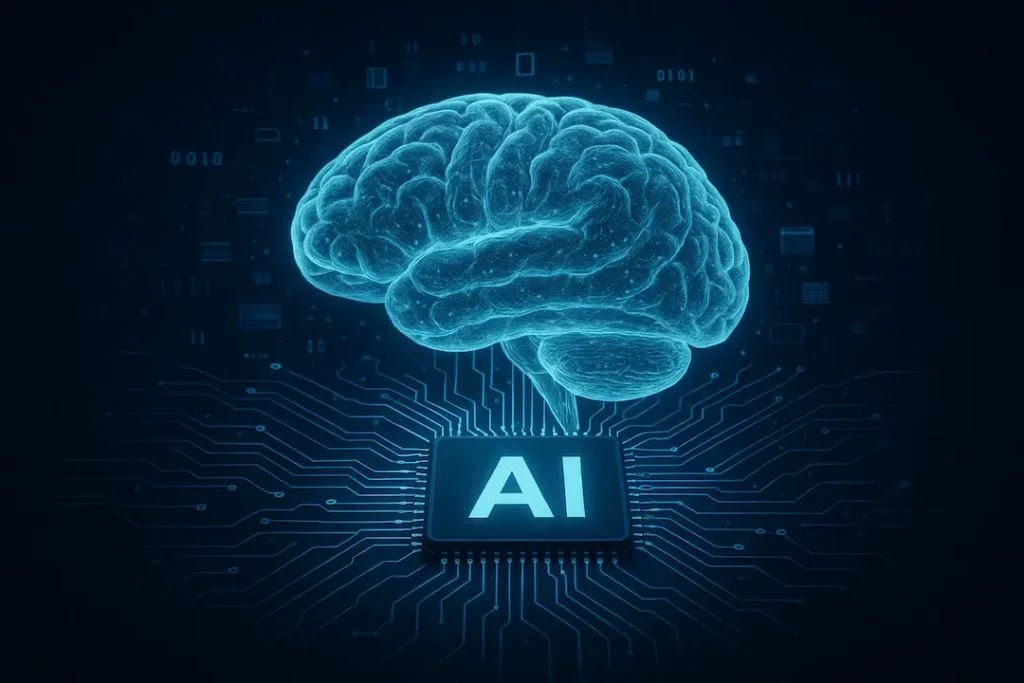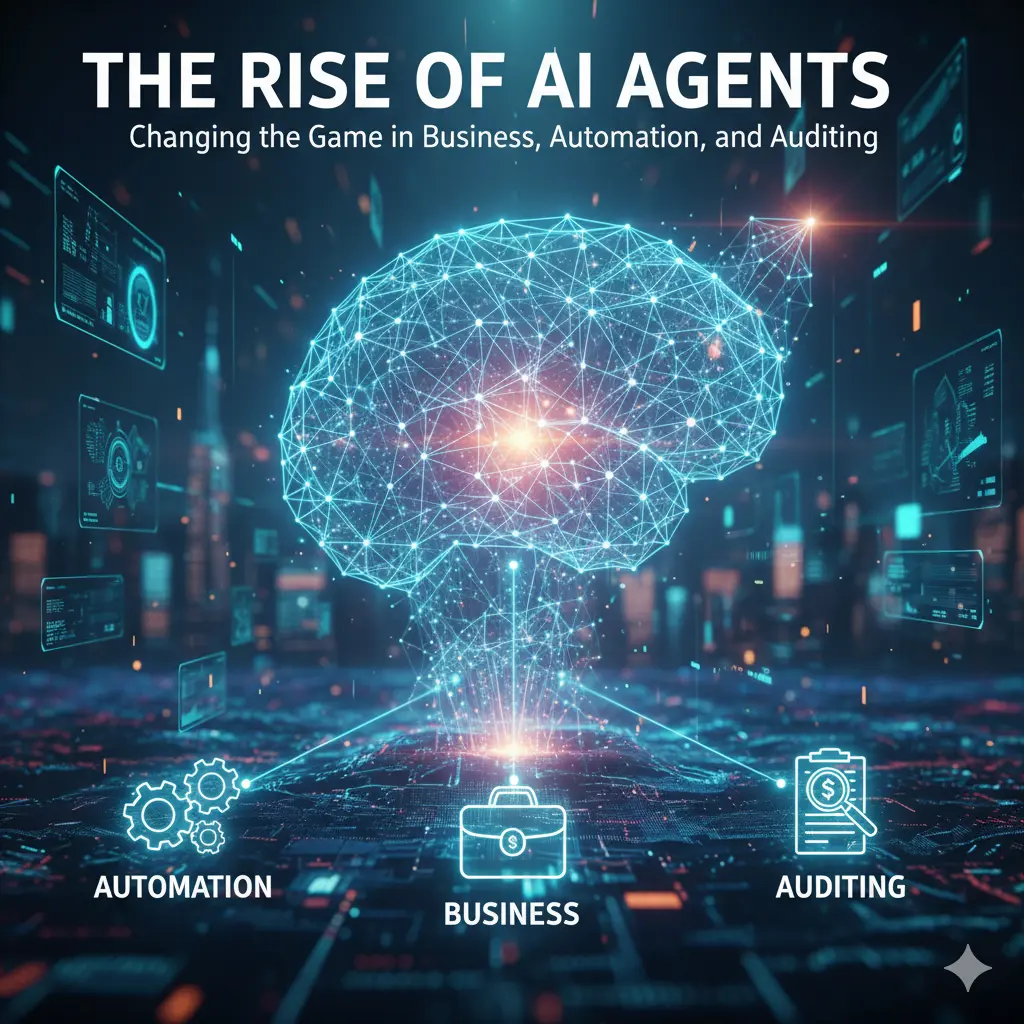
What if automation could not just follow rules, but think, learn, and adapt? Get ready, because the future of business is here, and it’s powered by something truly special: AI agents. They’re a whole new ballgame in smart automation, set to completely change how we get things done, make choices, and grow. These clever computer programs are already doing things regular automation could only dream of. They’re bringing us into a time where systems can jump into tricky tasks, grasp the big picture, and actually learn from everything they do. Stick around as we dive deep into the world of AI agents. We’ll chat about what they can do, how they’re shaking up all sorts of industries, the important stuff to think about before using them, and what’s next for this amazing tech.

What Are AI Agents and How Do They Differ from Regular Automation?
The term “AI agent” is getting a lot of buzz, but what exactly makes these intelligent systems stand out from the automation tools we’re already used to? This difference is super important if we want to really get how powerful they are.
Defining AI Agents: Independent, Smart, and Flexible
Think of an AI agent as a smart, independent computer program with a mission: to get things done or hit specific targets. What’s mind-blowing about them is that they don’t just follow a script. Oh no, they learn, they change, and they make smart calls on the fly, all thanks to real-time info and really understanding what’s going on.
So, what makes an AI agent an AI agent? Here are their superpowers:
- Independent Action: They can run on their own, starting tasks without needing someone to constantly nudge them.
- Brainpower: They use smart AI models (like those big language models you’ve heard about) to understand, think things through, and crunch information.
- Always Learning: They get smarter with every experience, tweaking how they do things to get better and better.
- Getting the Gist: Unlike stiff, rule-bound systems, AI agents actually grasp the tiny details of a situation. They can make sense of messy data like text, pictures, or speech, and even figure out what you *really* mean.
- Mission Driven: Give them a goal, and they’ll chase it! They’ll even break it down into smaller steps to get there.
- Awareness: They can ‘see’ and ‘hear’ what’s happening around them through different data feeds, almost like having their own senses.
Picture this: An AI agent doesn’t just stick to a script when a customer calls. Instead, it gets how the customer feels, sifts through tons of info from different places, then crafts a warm, personalized answer – all while getting better at it every single time. That’s the real magic right there.
AI Agents vs. RPA: Automation’s Next Step
For ages, Robotic Process Automation (RPA) has been the quiet superstar of digital changes. It’s awesome at handling those repetitive, step-by-step jobs with mind-blowing speed. Think of RPA as the master of “button-pushing automation” – it copies what a human would do on a computer screen to get structured tasks done, like typing in data, dealing with invoices, or making reports.
But here’s the thing: RPA has its limits. It fumbles with messy data, doesn’t really get the bigger picture, and can’t adjust if something unexpected pops up or a process changes without someone actually rewriting its rules. If a task wiggles even a little from its script, an RPA bot can often get stuck.
Now, AI agents? They’re the next big step forward. They blast past RPA’s hang-ups by bringing in some seriously smart AI powers. If RPA is about *doing* exactly what it’s told, AI agents are all about *thinking* and *figuring out* what should be done.
Let’s put them side-by-side:
| Feature | Robotic Process Automation (RPA) | AI Agents |
|---|---|---|
| Main Job | Copies what humans do; follows set rules. | Gets the big picture, learns, adapts; makes quick calls. |
| Data Work | Great with neat, predictable info. | Handles both neat and messy data (text, images, speech). |
| Choices | Sticks to clear, pre-set rules; inflexible. | Smart, independent choices based on goals and live info. |
| Flexibility | Low; needs new coding for changes. | High; learns from experience, changes how it works. |
| Task Difficulty | Best for routine, lots of the same tasks. | Good for tricky, thinking, changing, and info-heavy jobs. |
| Watching Over | Needs a lot of setup; errors can stop things. | Needs initial training, but learns and fixes itself; aims for results. |
| Smartness | Works without “getting” things. | Shows understanding, thinking, and problem-solving. |
This difference is a game-changer. Imagine an RPA bot neatly pulling info from a structured invoice. Now, an AI agent could read a customer’s messy email, spot the real problem, sift through tons of company knowledge, and then, all on its own, kick off a plan to fix it – maybe even writing a custom email to that customer. Talk about smart!
Think of examples like Claude’s Computer Use – it shows how an AI can actually ‘get’ and work with a computer, just like a person. Or tools like PromptQL, which are all about helping AI agents take action and make calls to different systems to automate entire processes from start to finish. These really show how AI agents connect ‘knowing what to do’ with ‘actually doing it,’ going way beyond simply following a list of rules.

The Big Impact of AI Agents Everywhere
The arrival of AI agents is a big deal, set to totally change how businesses run, come up with new ideas, and expand. Their power to handle tricky, ever-changing tasks is bringing levels of getting stuff done and truly smart insights we’ve never seen before in almost every field.
Boosting Productivity and Making Things Run Better
One of the quickest wins with AI agents is their superpower to automate those tricky processes that regular RPA just couldn’t handle. These are jobs that need a bit of brainpower – where you need to make judgments, get the whole picture, and deal with all sorts of messy information.
- Tackling Tough Tasks: From fancy supply chain puzzles to ever-changing customer chats, AI agents can dive into multi-step projects. They make sense of different kinds of information and make thoughtful calls. This lifts a huge, often dull and time-consuming, mental load off human teams.
- Smarter & Cheaper Operations: When businesses smooth out these advanced ways of working, they can cut down big-time on how much things cost to run and see a real jump in how fast they get things done. I saw this first-hand with a financial company: by using an AI agent to sort loan applications – looking at all sorts of info, even casual client messages – they chopped initial processing time by 40% and made things more accurate. This let their human experts focus on the really important stuff.
- Making Work Flow Everywhere: No matter the field – healthcare (automatically handling patient forms and first checks), manufacturing (making production schedules super smart based on what people need now and what materials are around), or legal (helping with contract reviews and keeping things on the up and up) – AI agents are making work easier and operations quicker and more spot-on.
Companies like SmythOS are leading the charge, creating AI-powered ways of working that are completely shaking up how businesses get productive. As smart folks like Gary Haymann often point out, the future isn’t just about automation, it’s about smart, flexible automation that learns and gets better right alongside your business.
Helping Us Make Smarter Choices and Sparking New Ideas
It’s not just about getting things done faster. AI agents are also amazing at helping us make better choices and come up with fresh ideas. They have this incredible knack for looking at massive amounts of live data, giving us insights that used to be impossible to get or took forever to dig up.
- Using Live Data for Smart Moves: AI agents can constantly keep an eye on what’s happening in the market, how customers are behaving, and all the info from inside the business. They spot trends and weird stuff that helps us make really smart choices. This means businesses can react quicker and smarter when things change.
- How they’re used in all sorts of places:
- Helping Customers & Crunching Numbers: AI agents can give customers a truly personal experience, sort out tricky questions, and even figure out how people are feeling to give great ideas for making products better.
- Making Work Better & Creating Stuff: Whether it’s shifting project deadlines on the fly or crafting awesome marketing content made just for certain groups of people, AI agents are proving to be super helpful.
- Personal Learning, Health Breakthroughs, and Money Smarts: Imagine AI agents building custom learning plans for students, helping doctors figure out chances of diagnoses using the newest research, or even finding those clever market opportunities for financial planners.
The effect is so huge that Sam Altman, who leads OpenAI, thinks AI agents could really shake up how productive businesses are by 2025. And he’s not alone! Smart folks at Gartner see “Agentic AI” as one of the top tech trends for 2025, showing just how big a deal it’s going to be for businesses everywhere.
Closing the AI Skills Gap
Even with all the cool stuff advanced AI can do, a lot of companies hit a wall: an AI skills gap. That’s a fancy way of saying there aren’t enough experts to build, launch, and look after these tricky AI systems. Guess what? AI agents are perfectly placed to help close that gap.
By taking away a lot of the fiddly bits of AI models, AI agents make setting up automation much easier. This opens up advanced AI powers to way more people. You can set them up to do pretty smart tasks with easier-to-use controls, letting everyone get their hands on awesome AI tools.
But here’s an important point: this doesn’t mean we need fewer talented people. Nope, the focus just changes. We really need to help our teams learn new skills to manage, oversee, and work well with these super-smart AI systems. Humans will increasingly become “AI conductors” – directing agents, understanding what they come up with, making sure everything runs fairly, and keeping an eye on the big picture instead of doing all the grunt work. Learning about prompt engineering, AI rules, and understanding data will become super important.
Dealing with the Tricky Bits: Risks, Rules, and Management in the World of AI Agents
While AI agents offer some seriously good stuff, bringing them into your business also brings a fresh set of challenges, worries, and duties that need a lot of thought. Having clear plans for how they’re managed, making sure they’re fair, and keeping them safe isn’t just a good idea – it’s an absolute must.
Getting Real About Ethics and Bias
Because AI agents act on their own and make decisions, it brings up some really important questions about what’s fair and right.
- The Danger of Unfair Choices: AI agents pick up everything from the data they learn from. If that data has old human prejudices, the agents can spread those prejudices, or even make them worse, in their choices. This could lead to unfair results when hiring, approving loans, or even in legal cases. And what about “AI hallucinations” – when AI makes up believable but totally wrong info? That’s another big ethical headache, especially when serious decisions are on the line.
- Why Did It Do That?: With a lot of these advanced AI systems, figuring out *why* an agent made a certain choice can be super tough. This “black box” issue is a real roadblock, especially in industries with lots of rules where you *have* to be open and able to explain decisions by law. We need to make sure AI agent choices can be checked and understood if we want people to trust them and hold them responsible.
Data Privacy and Security Weaknesses
AI agents often handle a ton of private information, which, by its nature, creates new spots for hackers to try and get in and opens up new weaknesses.
- Fresh Worries About Data Leaks: Because AI agents connect with so many different systems and data, they can become weak spots where private info could leak. If an agent gets hacked, it could spill sensitive customer details, private company secrets, or even creative ideas.
- We Need Strong Security: Keeping these digital bad guys out means we need smart, “always-on” security. This means things like unbreakable encryption, safe ways for data to flow, strict rules on who can see what, regular security checks on the AI models themselves, and always watching for anything fishy. Since AI agents are always changing, their security also needs to be flexible and smart.
The Need for Good AI Management and Rules
To make these risks smaller and make sure we use AI fairly, setting up a solid AI governance plan isn’t just a nice-to-have – it’s absolutely vital. This plan needs to cover rules, supervision, and ongoing checks.
Understanding the must-have compliance rules is key, especially for businesses that work in fields with lots of regulations. These include:
- SOC 1, SOC 2, ISO 27001: These focus on how you handle money reports, security, always-on availability, correct processing, privacy, and keeping systems secret.
- ISO 42001: A new standard specifically for AI management systems, dealing with fairness and handling risks in AI.
- HIPAA, HITRUST: Super important for healthcare, making sure private health info stays safe.
- GDPR: The top standard for data protection and privacy in Europe.
- FedRAMP, NIST: Government standards for cloud services and staying safe online, really important for agencies and their partners.
As Ben Burkett, a Partner at Linford & Company, often points out, “The job of auditors is more important than ever. They’re not just ticking boxes; they’re super important for setting up the solid rules needed to make sure AI tools are safe, follow the rules, and can be trusted.” His ideas show us that bringing in auditors right from the start of putting AI into action can help build trust and lower risks from day one.
Setting up a good AI management plan needs a few different angles. Here are some good ways to do things:
| Key Area for AI Management | What to Think About & Good Ways to Do Things |
|---|---|
| Fair AI Rules | Set up clear rules about what’s fair, open, and accountable. Run checks to find and fix any biases. |
| Data Rules | Create rules for how you gather, keep, use, and get rid of data. Make sure data is good quality and privacy is built in from the start. Use strong ways to make data anonymous. |
| Risk Handling | Spot possible problems (like security, privacy, day-to-day work, or even your reputation). Make plans to deal with them and quick action plans if something goes wrong. Always check and update your risk list. |
| Openness & Explanations | Put ways in place to explain what AI decided, when you can. Keep a clear record of everything AI agents do. Write down all about how models were built and what data they learned from. |
| Following Regulations | Keep up-to-date on new AI rules (like the EU AI Act). Do regular checks to make sure you’re following them. |
| Human Supervision | Plan for humans to step in when really important decisions need a look. Be clear about who does what when looking after AI agents. |
| Constant Checking | Watch AI agents closely in real-time – how they’re doing, how safe they are, and if they’re being fair. Set up ways to get feedback so they can keep getting better and adjusting. |

The Future Landscape: Automation with Agents and Beyond
The story of AI agents is just kicking off, but one thing’s for sure: they’re about to become a must-have part of every modern business. They’re not just changing tasks, they’re changing *everything* about how we run things.
The Team-Up: RPA and AI Agents Working Together
The future of getting things done automatically isn’t about one tech booting another out. Instead, it’s about them working together beautifully. The coolest new idea we’re seeing is “Agentic Automation” – a mix that cleverly brings together what RPA does best with the smarts of AI agents.
Imagine a really talented team: RPA is like the super-efficient worker for those step-by-step, repetitive jobs – the “hands” that make exact moves. AI agents, meanwhile, are the “brains,” bringing the smarts, the big picture, and quick thinking for those trickier situations.
Analogy: Imagine building a house. RPA is like the construction crew expertly laying bricks, following blueprints precisely. An AI agent is the project manager, assessing site conditions, adapting schedules to unexpected weather, sourcing alternative materials if needed, and helping the overall project stay on track and within budget – making smart choices based on a dynamic environment.
This amazing team-up lets businesses automate things from start to finish, handling both the stuff you can predict and the surprises that pop up. RPA takes care of the huge piles of structured data, while AI agents deal with the curveballs, make sense of messy info, and steer smart workflows. This means everything keeps running smoothly, even when things are changing fast.
Fast New Ideas and Businesses Jumping On Board
The speed at which AI agents are improving is simply amazing. AI thinkers like Ethan Mollick from Wharton see AI agents not just as handy tools, but as active players in our work, able to solve problems and work together with us. This big change in how we see them is really driving companies to develop them fast.
Big names like OpenAI and Google are putting tons of money into making super-smart AI agents, pushing the limits of what’s even possible. From code that fixes itself to smart agents that dig deep into data, this market is changing incredibly fast.
While everyone’s buzzing with excitement, it’s good to also look at where we are now with using them. The Wall Street Journal mentioned that even though 72% of companies are trying out AI, many of those are still experiments and often need a good amount of human checking. This shows we’re in a middle stage: AI agents are strong, but we’re still figuring out the best ways to bring them in and manage them carefully. We’re moving from just trying them out to using them everywhere with confidence, thanks to constant improvements and a better grasp of what they can really do.
Conclusion
The growth of AI agents isn’t just another cool gadget; it’s a huge change in how we think about getting things done automatically. It promises amazing productivity, smarter choices, and new ideas we’ve never seen before. These smart, flexible systems are set to completely redraw how businesses run, taking us past just following rules to a future where machines can genuinely “think” and “learn.”
Get in touch with us today!
Ready to tap into the power of AI agents for your business? Grab our easy-to-read guide to AI Agent setup today and discover how to navigate the future of smart automation!
FAQS
-
What’s the main difference between an AI agent and regular RPA?
The main difference is all about how smart and flexible they are. RPA follows pre-defined, stiff rules for structured tasks, while an AI agent can learn, change, understand the big picture, and make quick decisions, handling both neat and messy data.
-
How can businesses make sure AI agents are used fairly and without bias?
Companies need to put strong AI management plans in place, regularly check training data and algorithms for fairness, make sure decisions are clear, and have human teams look over and fix what agents do.
-
What are the key rules and standards for adding AI agents to a business?
Big ones include SOC 1/2, ISO 27001/42001, HIPAA (for health info), GDPR (for privacy), FedRAMP, and NIST. Sticking to these helps keep data safe and private, and means you’re using AI fairly.
-
Will AI agents completely take over human jobs in the future?
While AI agents will certainly take over a lot of tasks, they’re more likely to change jobs rather than wipe them out entirely. They’ll actually boost what humans can do, handling the routine or brainy chores, letting people focus on bigger picture planning, coming up with new ideas, and sorting out tough problems.
-
How can small and medium-sized businesses (SMBs) start using AI agents?
SMBs can kick things off by finding places where AI agents could really help and show clear results (like customer service or automating data entry). They should start with trial projects, use AI agent tools in the cloud (which usually costs less to get going), and teach their teams new skills to work well with these new tools.





